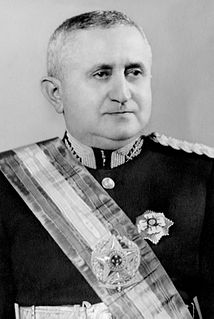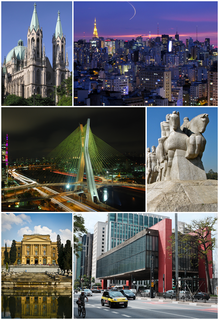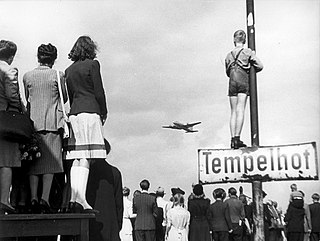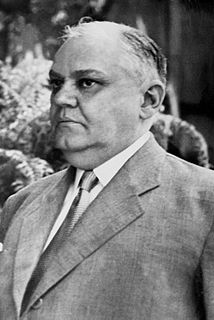| |||||||||||||||||||
| |||||||||||||||||||
| |||||||||||||||||||
 |
|---|
| This article is part of a series on the politics and government of Brazil |
| Foreign relations |
General elections were held in Brazil on 3 October 1950. [1] The presidential elections were won by Getúlio Vargas of the Brazilian Labour Party, whilst the Social Democratic Party remained the largest party in both the Chamber of Deputies and the Senate, although they lost their majority in the former. Voter turnout was 72.1% in the presidential election, 72.0% in the Chamber elections and 77.7% in the Senate elections. [2]

Brazil, officially the Federative Republic of Brazil, is the largest country in both South America and Latin America. At 8.5 million square kilometers and with over 208 million people, Brazil is the world's fifth-largest country by area and the fifth most populous. Its capital is Brasília, and its most populated city is São Paulo. The federation is composed of the union of the 26 states, the Federal District, and the 5,570 municipalities. It is the largest country to have Portuguese as an official language and the only one in the Americas; it is also one of the most multicultural and ethnically diverse nations, due to over a century of mass immigration from around the world.

Getúlio Dornelles Vargas was a Brazilian lawyer and politician, who served as President during two periods: the first was from 1930–1945, when he served as interim president from 1930–1934, constitutional president from 1934–1937, and dictator from 1937–1945. After being overthrown in a 1945 coup, Vargas returned to power as the democratically elected president in 1951, serving until his suicide in 1954. Vargas led Brazil for 18 years, the longest of any President, and second in Brazilian history only to Emperor Pedro II among heads of state. He favored nationalism, industrialization, centralization, social welfare and populism – for the latter, Vargas won the nickname "The Father of the Poor". Vargas is one of a number of populists who arose during the 1930s in Latin America, including Lazaro Cardenas and Juan Perón, who promoted nationalism and pursued social reform. He was a proponent of workers' rights as well as a staunch anti-communist.
The Brazilian Labour Party was a centre-left populist political party in Brazil founded in 1945 by supporters of President Getúlio Vargas. It was dismantled by the military after 1964 coup d'état.



















